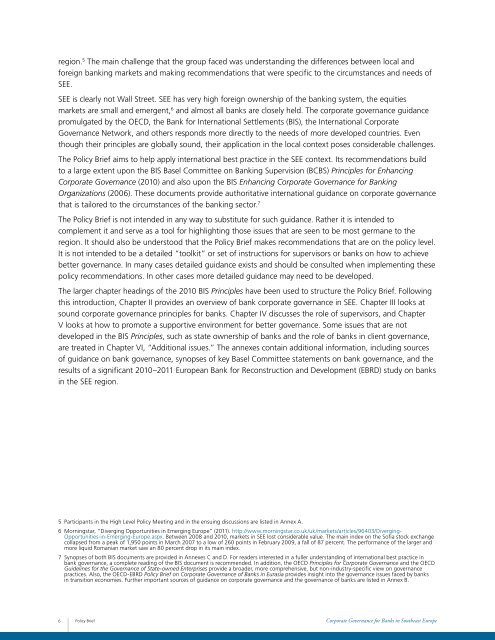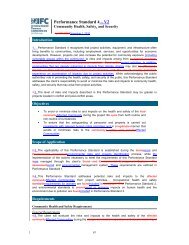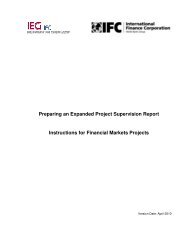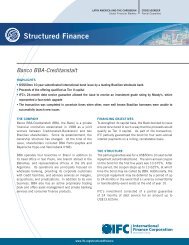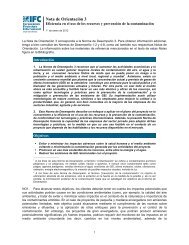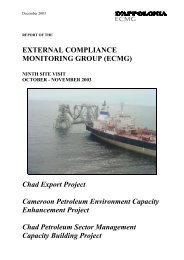Corporate Governance for Banks in Southeast Europe: Policy - IFC
Corporate Governance for Banks in Southeast Europe: Policy - IFC
Corporate Governance for Banks in Southeast Europe: Policy - IFC
Create successful ePaper yourself
Turn your PDF publications into a flip-book with our unique Google optimized e-Paper software.
egion. 5 The ma<strong>in</strong> challenge that the group faced was understand<strong>in</strong>g the differences between local and<br />
<strong>for</strong>eign bank<strong>in</strong>g markets and mak<strong>in</strong>g recommendations that were specific to the circumstances and needs of<br />
SEE.<br />
SEE is clearly not Wall Street. SEE has very high <strong>for</strong>eign ownership of the bank<strong>in</strong>g system, the equities<br />
markets are small and emergent, 6 and almost all banks are closely held. The corporate governance guidance<br />
promulgated by the OECD, the Bank <strong>for</strong> International Settlements (BIS), the International <strong>Corporate</strong><br />
<strong>Governance</strong> Network, and others responds more directly to the needs of more developed countries. Even<br />
though their pr<strong>in</strong>ciples are globally sound, their application <strong>in</strong> the local context poses considerable challenges.<br />
The <strong>Policy</strong> Brief aims to help apply <strong>in</strong>ternational best practice <strong>in</strong> the SEE context. Its recommendations build<br />
to a large extent upon the BIS Basel Committee on Bank<strong>in</strong>g Supervision (BCBS) Pr<strong>in</strong>ciples <strong>for</strong> Enhanc<strong>in</strong>g<br />
<strong>Corporate</strong> <strong>Governance</strong> (2010) and also upon the BIS Enhanc<strong>in</strong>g <strong>Corporate</strong> <strong>Governance</strong> <strong>for</strong> Bank<strong>in</strong>g<br />
Organizations (2006). These documents provide authoritative <strong>in</strong>ternational guidance on corporate governance<br />
that is tailored to the circumstances of the bank<strong>in</strong>g sector. 7<br />
The <strong>Policy</strong> Brief is not <strong>in</strong>tended <strong>in</strong> any way to substitute <strong>for</strong> such guidance. Rather it is <strong>in</strong>tended to<br />
complement it and serve as a tool <strong>for</strong> highlight<strong>in</strong>g those issues that are seen to be most germane to the<br />
region. It should also be understood that the <strong>Policy</strong> Brief makes recommendations that are on the policy level.<br />
It is not <strong>in</strong>tended to be a detailed “toolkit” or set of <strong>in</strong>structions <strong>for</strong> supervisors or banks on how to achieve<br />
better governance. In many cases detailed guidance exists and should be consulted when implement<strong>in</strong>g these<br />
policy recommendations. In other cases more detailed guidance may need to be developed.<br />
The larger chapter head<strong>in</strong>gs of the 2010 BIS Pr<strong>in</strong>ciples have been used to structure the <strong>Policy</strong> Brief. Follow<strong>in</strong>g<br />
this <strong>in</strong>troduction, Chapter II provides an overview of bank corporate governance <strong>in</strong> SEE. Chapter III looks at<br />
sound corporate governance pr<strong>in</strong>ciples <strong>for</strong> banks. Chapter IV discusses the role of supervisors, and Chapter<br />
V looks at how to promote a supportive environment <strong>for</strong> better governance. Some issues that are not<br />
developed <strong>in</strong> the BIS Pr<strong>in</strong>ciples, such as state ownership of banks and the role of banks <strong>in</strong> client governance,<br />
are treated <strong>in</strong> Chapter VI, “Additional issues.” The annexes conta<strong>in</strong> additional <strong>in</strong><strong>for</strong>mation, <strong>in</strong>clud<strong>in</strong>g sources<br />
of guidance on bank governance, synopses of key Basel Committee statements on bank governance, and the<br />
results of a significant 2010–2011 <strong>Europe</strong>an Bank <strong>for</strong> Reconstruction and Development (EBRD) study on banks<br />
<strong>in</strong> the SEE region.<br />
5 Participants <strong>in</strong> the High Level <strong>Policy</strong> Meet<strong>in</strong>g and <strong>in</strong> the ensu<strong>in</strong>g discussions are listed <strong>in</strong> Annex A.<br />
6 Morn<strong>in</strong>gstar, “Diverg<strong>in</strong>g Opportunities <strong>in</strong> Emerg<strong>in</strong>g <strong>Europe</strong>” (2011). http://www.morn<strong>in</strong>gstar.co.uk/uk/markets/articles/96403/Diverg<strong>in</strong>g-<br />
Opportunities-<strong>in</strong>-Emerg<strong>in</strong>g-<strong>Europe</strong>.aspx. Between 2008 and 2010, markets <strong>in</strong> SEE lost considerable value. The ma<strong>in</strong> <strong>in</strong>dex on the Sofia stock exchange<br />
collapsed from a peak of 1,950 po<strong>in</strong>ts <strong>in</strong> March 2007 to a low of 260 po<strong>in</strong>ts <strong>in</strong> February 2009, a fall of 87 percent. The per<strong>for</strong>mance of the larger and<br />
more liquid Romanian market saw an 80 percent drop <strong>in</strong> its ma<strong>in</strong> <strong>in</strong>dex.<br />
7 Synopses of both BIS documents are provided <strong>in</strong> Annexes C and D. For readers <strong>in</strong>terested <strong>in</strong> a fuller understand<strong>in</strong>g of <strong>in</strong>ternational best practice <strong>in</strong><br />
bank governance, a complete read<strong>in</strong>g of the BIS document is recommended. In addition, the OECD Pr<strong>in</strong>ciples <strong>for</strong> <strong>Corporate</strong> <strong>Governance</strong> and the OECD<br />
Guidel<strong>in</strong>es <strong>for</strong> the <strong>Governance</strong> of State-owned Enterprises provide a broader, more comprehensive, but non-<strong>in</strong>dustry-specific view on governance<br />
practices. Also, the OECD-EBRD <strong>Policy</strong> Brief on <strong>Corporate</strong> <strong>Governance</strong> of <strong>Banks</strong> <strong>in</strong> Eurasia provides <strong>in</strong>sight <strong>in</strong>to the governance issues faced by banks<br />
<strong>in</strong> transition economies. Further important sources of guidance on corporate governance and the governance of banks are listed <strong>in</strong> Annex B.<br />
6<br />
<strong>Policy</strong> Brief<br />
<strong>Corporate</strong> <strong>Governance</strong> <strong>for</strong> <strong>Banks</strong> <strong>in</strong> <strong>Southeast</strong> <strong>Europe</strong>


